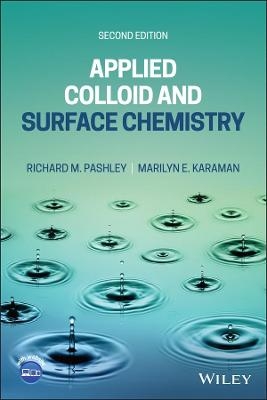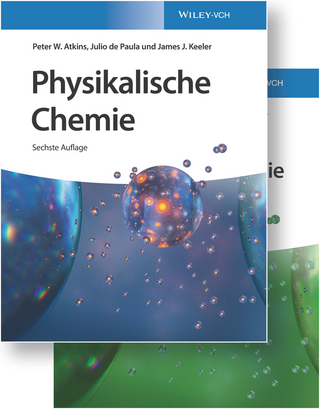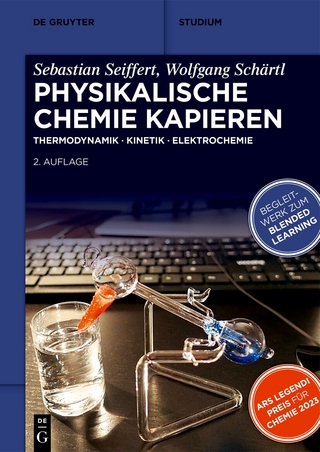
Applied Colloid and Surface Chemistry
John Wiley & Sons Inc (Verlag)
978-1-119-73912-8 (ISBN)
The revised and updated second edition of Applied Colloid and Surface Chemistry offers a comprehensive introduction to this interdisciplinary field that takes a practical approach and includes information on applications drawn from a wide range of industries. The easy-to-follow text contains new content that focuses on applications such as the prevention of propeller cavitation, industrial explosives, PFAS contamination, and bubble column evaporators.
With contributions from noted experts on the topic, the book contains keynote sections written by practicing industrial research scientists, who highlight real-world industrial examples. These examples range from water treatment through to soil management as well as examples from the coatings and photographic industries. Designed as an accessible resource, the book separates the more demanding mathematical derivations from the main text. The text features approachable, structured chapters, learning objectives, tutorial questions with answers, and explanatory notes. This important book:
Offers a combination of physicochemical background, industrial, and everyday applications and experiments
Underlines the importance of colloidal sciences in science and industry
Presents real-world industrial applications
Includes tried and tested laboratory experiments
Written for students of chemistry, materials science, and engineering, Applied Colloid and Surface Chemistry, Second Edition offers an updated guide to soft matter presenting the bridge between science, with proven laboratory experiments, and real-world industrial applications.
Richard M. Pashley, PhD, is Research Professor at the University of New South Wales, Canberra. Marilyn E. Karaman, PhD, is a Visiting Fellow at the University of New South Wales, Canberra.
Chapter 1 Introduction: Introduction to the scope and form of the book. The nature of colloids, the linkage between colloids and surface properties, introduction to wetting and surface modifications.
Chapter 2 Surface tension and wetting: Equivalence of the force and energy description of surface tension/energy, derivation of the Laplace pressure, methods for determining the surface tension of liquids. The surface energy and cohesion of solids, wetting and the liquid contact angle. Laboratory projects for measuring the surface tension of liquids and liquid contact angles.
Chapter 3 The prevention of propeller cavitation: A history of propeller cavitation, the damage and detrimental effects it causes and attempts to reduce it.
Theory of cavitation of aqueous and non-aqueous liquids. Prevention of propeller cavitation via local thin film coatings.
Chapter 4 Thermodynamics of adsorption: Derivation of the Gibbs Adsorption Isotherm. Determination of the adsorption of surfactants at liquid interfaces. Laboratory project to determine the surface area of the common adsorbent powdered activated charcoal.
Chapter 5 Surfactants and self assembly: Introduction to the variety of types of surfactants, effect of surfactants on aqueous solution properties. Law of mass action applied to the self assembly of surfactant molecules in water. Spontaneous self assembly of surfactants in aqueous media. Formation of micelles, vesicles and lamellar structures. Critical packing parameter. Detergency. Laboratory project on determining the charge of a micelle.
Chapter 6 PFAS Contamination:Historical use of PFAS compounds and their chemical and biological properties.Surface chemistry in soils and in groundwater.
Novel processes for the removal of PFAS compounds from soils and groundwater
Chapter 7 Emulsions and microemulsions: The conditions required to form an emulsion of oil and water and a microemulsion. The complex range of structures formed by a microemulsion fluid. Emulsion polymerization and the production of latex paints. Photographic emulsions. Emulsions in food science. Laboratory project on determining the phase behaviour of a microemulsion fluid.
Chapter 8 Charged colloids: The generation of colloidal charges in water. The diffuse electrical double layer. The Zeta potential. The flocculation of charged colloids. The interaction between two charged surfaces in water. Laboratory project on the use of microelectrophoresis to measure the zeta potential of a colloid.
Chapter 9 Van der Waals forces and colloid stability: Historical development of van der Waals forces. The Lennard-Jones potential. Intermolecular forces. Van der Waals forces between surfaces and colloids. The Hamaker constant. The DLVO theory of colloidal stability.
Chapter 10 Bubble coalescence, foams and thin surfactant films: Thin film stability. The effect of surfactants on film and foam stability. Surface elasticity. Froth flotation. The Langmuir trough and monolayer deposition. Laboratory project on the flotation of powdered silica.
Chapter 11 Bubble Column Evaporators (BCEs): Theory of bubble columns: their mass and thermal transfer rates and rate of bubble rise. The surprising effects of salt on bubble coalescence. Evaporative cooling and its use in a novel measurement of the enthalpy of vaporization of concentrated salt solutions. Novel industrial applications of BCEs. Experiment 11.1 Determination of the enthalpy of vaporization of concentrated salt solutions.
Appendices
Appendix 1: Fundamental Constants.
Appendix 2: Mathematical notes on the Poisson-Boltzmann equation.
Appendix 3: Notes on 3-D differential calculus and the fundamental equations of electrostatics.
| Erscheinungsdatum | 27.08.2021 |
|---|---|
| Verlagsort | New York |
| Sprache | englisch |
| Maße | 150 x 226 mm |
| Gewicht | 431 g |
| Themenwelt | Naturwissenschaften ► Chemie ► Physikalische Chemie |
| Technik ► Maschinenbau | |
| ISBN-10 | 1-119-73912-8 / 1119739128 |
| ISBN-13 | 978-1-119-73912-8 / 9781119739128 |
| Zustand | Neuware |
| Haben Sie eine Frage zum Produkt? |
aus dem Bereich


